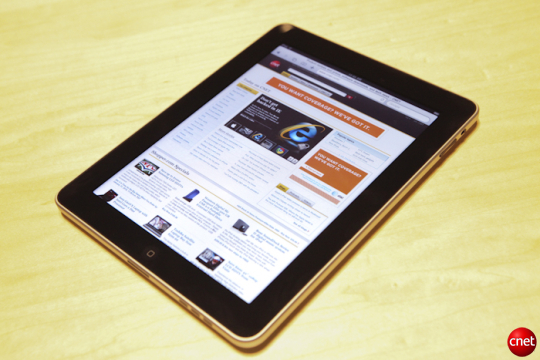Can Apple's iPad succeed? Just ask Nintendo's Wii

Minority Report: Both exhibit a simplicity that at first is misunderstood
Despite the lacklustre reception, don't give up on Apple's iPad just yet, says Seb Janacek. The tablet has much in common with the at first equally misunderstood - yet now wildly successful - Nintendo Wii gaming console.
Beneath the television in my lounge are two game consoles. The beige one is an Xbox 360; the white one is a Nintendo Wii.
The Xbox is generally considered, along with the PlayStation 3 (PS3), to be a gaming console for 'serious' gamers, if you'll excuse the oxymoron.
It has a big hard drive, digital output via HDMI to provide high definition gaming and upscales DVD playback. The PS3 has the added attraction of being a Blu-ray player. The control pads for both Xbox and PS3 have an impressive array of buttons, paddles and directional control sticks.
Please bear with me... this is building to an argument for why Apple's iPad is misunderstood, I promise.
Now, the Wii is not highly powered, nor does it let you play DVDs (let alone Blu-ray discs). It resolutely lacks a digital output meaning that - shudder - you can see pixels on your HDTV. The wireless controller you wave about lacks any sort of accurate control unless you buy the Motion Plus extension, which maps your gestural commands more faithfully.
The Wii therefore must not be a device for serious gamers.

Don't dismiss the Apple iPad just yet
Photo credit: James Martin/CNET
What the Wii does manage to do rather well is wipe the floor with the Xbox and PS3 when it comes to selling game consoles. Nintendo sells roughly twice as many consoles as either Sony or Microsoft and has consistently outsold its competitors since the Wii's launch. Games consoles for non-traditional gamers are spearheading console sales - the market has been turned on its head. So much then for 'serious gaming'.
Now onto the iPad...the big reveal of the Apple's tablet last month left many wailing and gnashing their teeth. Rather than surge to new heights, Apple's share price flickered nervously. Investors apparently didn't understand the new device; they probably still don't.
The launch of the Wii was similar to the launch of the iPad in many ways. The Wii disappointed many in 2006. There was criticism that Nintendo's console was underpowered and, like the iPad, a lot of schoolboy jokes about the product name. Segments of the gaming community savaged the Wii when it launched - it didn't do this, it didn't do that, it didn't appeal to them.
In the same way, many of the people disappointed with the iPad were preoccupied by what it didn't have. This is typical of most Apple product launches but particularly true of the iPad, which had been the subject of years of feverish and fantastical speculation.
The device has been criticised for lacking one (or more) cameras, for not supporting Flash, for its lack of ports and expansion options and for its lack of true multitasking. In other words it's clearly not for 'serious' computing.
Not only is Apple not worried about these deficiencies - I suspect it was part of the iPad's marketing plan...
This is, after all, a whole new product space that Apple is laying claim to. The tablet computer isn't new - there have been dozens of those. Rather, the iPad is the tablet computer as re-imagined by Apple - in the same way that the Macintosh was a re-imagination of the personal computer, the iPod was a revelation for the personal music player and the iPhone a new dawn for mobile phones.
With the iPad Apple has stripped away all the unnecessary clutter standing between people and the content and data they care about. It has made the veneer of technology secondary to the user experience and the act of consuming media.
Apple has done this in order to expand its customer base. The 'Switch' and 'Get a Mac' campaigns aimed at capturing disenfranchised Windows users. The iPad will probably be marketed to people who want what computers can deliver but have no truck with operating system service packs, USB 2.0, Bluetooth and, heavens forbid, multitasking.
Nintendo's success with Wii is based on simplicity and inclusivity, drawing existing and new customers into the gaming experience rather than promoting superior, high-spec consoles. It promotes what technology can do for you rather than what it is in itself.
I got my Wii in Christmas 2008. Three generations of my family watched the un-boxing of the console. The middle generation connected and configured it, the kids looked on with confusion and interest while the grandparents looked on with confusion and trepidation.
The Nintendo Wii was similarly misunderstood when it was first launched
Photo credit: Mona via Flickr under the following Creative Commons Licence
By lunchtime it was like being trapped inside the dream of Nintendo marketing manager: three generations of the family competing in bowling, golf and Mario. All we needed was the Redknapp family cheering wildly from the sofa and Ant and Dec sorting out the turkey in the kitchen.
For a serious Xbox gamer like myself, it was a revelatory moment - even beyond the realisation that being thrashed at Wii Sports bowling by your four-year-old daughter is a humbling experience.
Take a look at the magazine stand in your local supermarket and check the covers for PS3/Xbox magazines versus the Wii. The former are all about awesome graphics, featuring hulking, horrific creatures or heavily armed space marines and employ adjectives such as 'ultimate' or 'awesome'.
Meanwhile, the Nintendo covers feature cartoon plumbers riding cuddly dinosaurs and model families dressed in primary colours, waving white Wii remotes and flashing perfect smiles.
At the time of the Wii launch, Nintendo's chief designer Shigeru Miyamoto told BusinessWeek: "We started with the idea that we wanted to come up with a unique game interface. The consensus was that power isn't everything for a console. Too many powerful consoles can't coexist. It's like having only ferocious dinosaurs. They might fight and hasten their own extinction."
What Apple and Nintendo are doing is whipping technology away from under the noses of the kind of people who give a hoot about expandability, processor speed and multitasking.
The iPad represents the disenfranchisement of the geek and the continued democratisation not of technology but of the experiences and interactions that technology enables.
The geek hegemony over technology is ending. The geek may still have a role to play - but it looks to be turning into a supporting one to the non-technical among us.